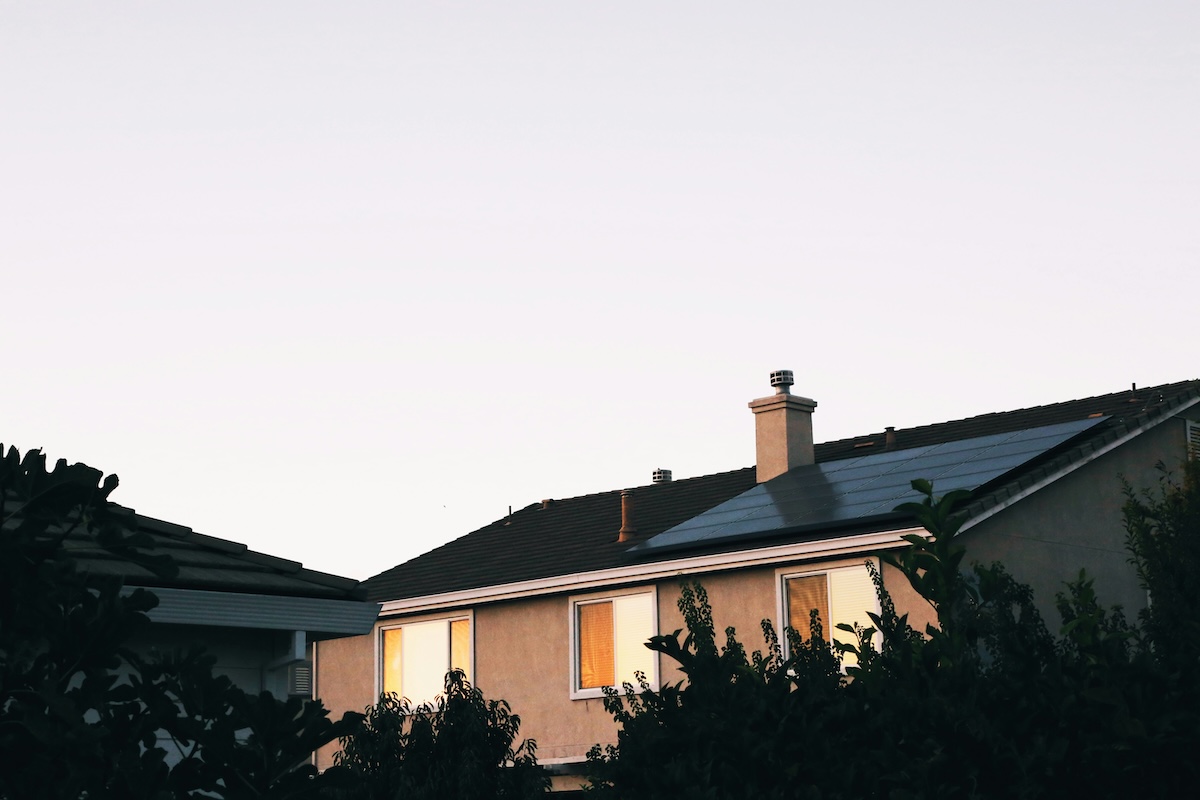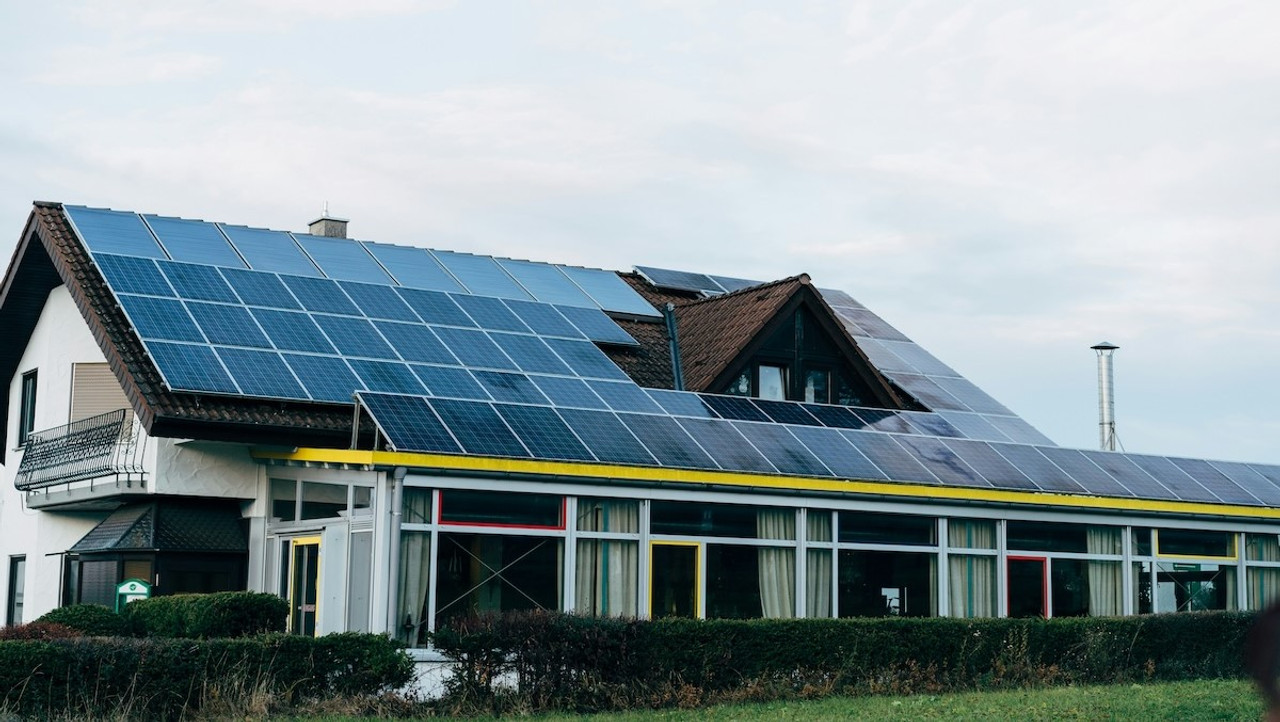Solar Panels For Home: Types of Solar Panels & Installation Cost
Due to the rise in electric rates in the United States, most homeowners have started to recognize the importance of adopting sustainable energy solutions that would reduce their reliance on grid power. Now that the nationwide average electricity rate is 16.88 ¢/kWh, residents have started looking for solar panels for homes.
Investing in solar panels promotes environmental sustainability and provides significant financial benefits. Solar panels for homes offer an eco-friendly alternative to traditional on-grid power sources and even completely eliminate electricity bills.
How to Do Solar Panels for Home Works
If you plan to buy solar panels for your home or business, it is highly recommended that you understand how exactly this system works. Home solar panels, also referred to as photovoltaic panels for home, convert sunlight into electricity through a series of well-coordinated steps.
Step 1: Sunlight Hits the Solar Panels
Solar panels are installed on rooftops or open areas and placed to receive maximum sunlight. Each panel of this eco-friendly system comprises numerous solar cells that can harness solar light.
Step 2: Photovoltaic Effect
Solar cells are semiconductors, as they are composed of silicon. When sunlight, or photons, strikes the solar cells, it triggers the photovoltaic effect. The process first starts when photons are absorbed, knocking electrons loose from their atoms. The direct current (DC) of electricity is created when the freed electrons are moved in a specific direction.
Step 3: Inverter Conversion
We cannot immediately use this generated DC electricity as most household appliances are operated on alternating current (AC). Therefore, we need to connect the solar panels to an inverter (pure sine wave one) that would convert the DC into AC electricity.
Step 4: Electrical Panel Distribution
Once the electricity is converted into AC and sent to the home's breaker box. From this electrical panel, the AC current is evenly distributed throughout the house to power appliances.
Step 5: Battery Storage
Any excess electricity generated by the solar panels can be fed back into the grid through net metering. This excess electricity can be stored in a battery system, which homeowners can use during the night or cloud sky.
How to Choose the Right Solar Panel For Home
Choosing the right solar panel for a home is important as it ensures long-term benefits and does not empty the pockets. In most cases, always go ahead with solar panels that meet your daily requirements and are also economical. Some of the most common factors that you need to consider while buying solar panels for your home are:
Efficiency and Power Output
Solar panel efficiency measures how well a panel converts sunlight into usable electricity. It is recommended to look for such panels that have higher efficiency ratings, usually between 15 - 22%, to get the most power output per square foot. For instance, you can check out the Bifacial 320-Watt Monocrystalline Solar Panel from Renogy, which has a power output of 416W and an efficiency of 19.2%.
Cost and Budget
The initial investment in solar panels can be significant, but it's important to consider the long-term savings on electricity bills and potential incentives. The entire solar panel system might cost you $20,000 - $25,000, depending on the solar panel size, your location, and government rebate programs. So, compare the cost per watt of different panels that would help you find an ideal balance between upfront costs and efficiency.
Durability and Warranty
Solar panels are exposed to various weather conditions, including heat waves, snowfall, and extreme rains. So, before buying solar panels for homes, always consider those with strong warranties. For instance, the Bifacial 320 Watt Monocrystalline Solar Panel from Renogy comes with an enhanced 25-year performance warranty.
Manufacturer and Product Quality
Always remember that not all manufacturers will create the same good-quality solar panels. Before making a well-informed decision, it is highly recommended to research reputable manufacturers who have garnered good customer reviews. By checking real reviews and comparing products, you will learn which company is more dedicated and is the right fit for your solar needs.
Appliance Usage
If you live in a small house and have a limited number of appliances, like a laptop, smartphone, and television, and you do not intend to buy more appliances, then you should go ahead with small-size solar panels, like a 50-Watt 12 Volt Monocrystalline Solar Panel. However, you will require a solar panel with larger output power if you have a large family that uses multiple appliances, like dishwashers, televisions, electric water heaters, etc.
Types of Solar Panels for Homes
Homeowners can choose from three main types of solar panels for homes. They are grid-tied, hybrid, and off-grid solar panels, and each has its unique features and benefits.
Grid-Tied Solar Panels
Grid-tied solar systems are the most common type of residential solar setup. These systems are connected to the local utility grid, which allows the homeowners to use solar power when available and draw electricity from the grid when solar production is insufficient, like during the night or when there is little to no surplus stored in the battery.
Off-Grid Solar Panels
Off-grid solar sys Hybrid solar systems combine the features of grid-tied and off-grid systems. They are connected to the grid but also include battery storage, which helps homeowners store excess solar energy they can use later. Unlike grid-tied and offtems are completely independent of the utility grid. It means that they rely entirely on solar panels and battery storage to power or charge your household appliances. Such systems are usually ideal for remote areas where there is a limit to access the grid power. That said, this solar panel system requires a larger initial investment as the homeowners will have to ensure they are getting adequate energy production.
Hybrid Solar Panels
Hybrid solar systems combine the features of grid-tied and off-grid systems. They are connected to the grid but also include battery storage, which helps homeowners store excess solar energy they can use later. Unlike grid-tied and off-grid solar panels, hybrid systems offer the flexibility to switch between solar power, battery storage, and grid power. Such flexibility makes them an attractive option for first-time solar buyers.

Is Your Roof Suitable For Solar Panels
Once you have evaluated different types of solar panels for your home, it is important to understand whether or not your roof is suitable for solar panels or not. Before making a substantial investment in solar panel system, you should consider some key factors, like:
- Roof Orientation: It is a known fact that the south-facing roofs receive the most sunlight and it maximizes solar panel efficiency.
- Roof Angle: Experts have suggested that the optimal roof angles for solar panels range between 15 and 40 degrees.
- Shading: If your house is surrounded by large trees or buildings, they will obstruct and reduce the efficiency of the solar panels.
- Roof Condition: A roof in good condition with no need for immediate repairs is ideal. In most cases, solar panels have a good life, but if there are structural issues with your roof, then it will directly affect the overall efficiency.
- Roof Space: Adequate space is required to install the solar panels correctly. Larger and unobstructed roof areas are preferable to smaller roofs.
Costs of Home Solar Panels for Home
Once you have decided to install solar panels, you will need to consider the overall investment cost associated with them. Here's a breakdown of the costs associated with home solar panels:
- Initial Purchase and Installation: In most states, the average cost for a solar panel system is between $15,000 and $25,000 without incentives and rebates. This total cost includes the cost of panels, inverters, stacking equipment, and labor.
- Federal and State Incentives: According to the Department of Energy, if you installed solar PV systems in 2020 and 2021, you are eligible for a 26% tax credit. But any solar PV systems installed post 2021 will get a 30% tax credit.
- Maintenance Costs: Most good-quality solar panels require minimal maintenance, but occasional cleaning or inspection may cost around $100 - $300 annually.
- Battery Storage: If you are looking to get a high-capacity battery to store the excess energy produced from the solar panels, then it may increase the overall cost by $5,000 to $10,000.
If you find that these are lump sum costs and you are looking for economical options, then you can always check out a wide range of solar panels, inventors, and solar system accessories from Renogy.
Are home solar panels worth it?
This would be very subjective to answer, but if you are looking for ways to reduce your reliance on grid power, help the environment, and save money after a large initial investment, then yes, solar panels for home are definitely worth it. By generating your own electricity, you can drastically reduce or even eliminate your monthly electricity bills.
Additionally, most places, like Texas, Florida, and California, offer substantial incentives, rebates, and tax credits that help lower your initial investment cost.
Beyond the financial advantages, solar panels contribute to a cleaner tomorrow. When we harness the sun's renewable energy, we reduce our dependence on fossil fuels, which are considered the major contributors to pollution and climate change.
FAQs about solar panels for home
1. How many solar panels are needed to run a house?
The number of solar panels needed depends on multiple factors, including your household's energy consumption, the panels' efficiency, and the amount of sunlight your location receives. That said, a family of four living in a 1200 sq. ft. house may require 20-30 panels to cover their monthly energy needs.
2. Do solar panels work during a power outage?
Yes, if you have assembled battery storage with your grid-tied solar systems, you can still use them during a power outage.
3. Do solar panels increase the value of my home?
Yes, most realtors have noticed that house values increase after homeowners install solar panels on their roofs. Houses with solar panels are also sold much more quickly than those that still use grid power.
4. Can solar panels work at night?
Solar panels are inoperational at night as they require natural sunlight to produce power. However, if you have added solar batteries to the panel that have stored energy during the day, then you can use them to power your household during nighttime hours.
Conclusion
Investing in solar panels for homes will help cut costs on the overall electricity bill. It not only reduces monthly electricity bills but also contributes to a sustainable future. Despite the initial investment, solar panels for homes have long-term financial advantages. Furthermore, the use of solar panels over traditional electricity has a positive impact on the environment. If you want to reduce your carbon footprint by investing in home solar panels, you may consider Renogy solar kits. They are powerful and highly efficient charging solutions that can help you lower your dependence on the utility grid or even enjoy complete off-grid living.











